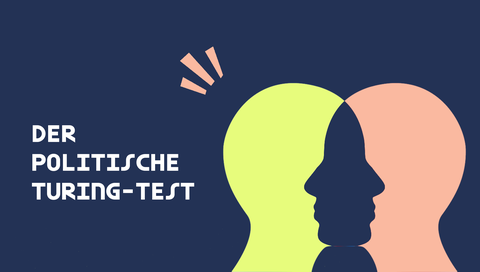Politischer Turing-Test
Spielerisch eine empathische Auseinandersetzung mit kontroversen Themen initiieren.
In der aktuellen politischen Erkenntnistheorie wird kognitive Empathie bzw. die Fähigkeit zu empathischem Verstehen konträrer Positionen als eine wichtige Voraussetzung deliberativer Demokratie diskutiert und als eine Kompetenz verstanden, die dazu beiträgt, sogenannter gesellschaftlicher Polarisierung entgegenzuwirken. Eine Möglichkeit festzustellen, ob eine Person kognitive Empathie besitzt, ist laut dem Ökonomen Bryan Caplan die Durchführung eines politischen Turing-Tests. Dieser funktioniert folgendermaßen: Eine Person wird aufgefordert, sich in die Position ihrer/ihres ideologischen bzw. politischen Kontrahent:in hineinzuversetzen und aus dieser Rolle heraus befragen zu lassen und dabei diese Position zu verteidigen. Wenn die Fragende nicht zwischen dieser Person und einer/einem echten Vertreter:in der eingenommenen Position unterscheiden kann, könne der Person laut Caplan kognitive Empathie zugeschrieben werden.
Wir haben uns gedacht: Vielleicht eignet sich der politische Turing-Test nicht nur als Messinstrument, sondern auch als Format der politischen Bildung zur Förderung kognitiver Empathie. Um dies einmal auszuprobieren, haben wir das Grundprinzip des politischen Turing-Tests für die „Build Peace“-Friedenskonferenz in eine Performance überführt. Unserer Beobachtung zufolge eignet sich das Format hervorragend, um eine empathische Auseinandersetzung zu kontroversen Thesen anzuregen, da diese anders als in üblichen Dialogformaten weniger konfrontativ geführt wird und sich weniger zur Agitation eignet. Im Hinblick auf die Weiterentwicklung des Formats könnte eine Kombination mit Methoden der Gewaltfreien Kommunikation reizvoll sein. Vorstellbar ist auch eine Überführung in ein Workshop-Format oder Konversationskartenset. In diesem Zusammenhang suchen wir nach Aktiven im Feld der politischen Bildungsarbeit, die Lust haben, das Format im Rahmen ihrer politischen Bildungsarbeit umzusetzen und von uns dabei nochmal systematischer begleitet zu werden. Falls Sie daran Interesse haben, melden Sie sich gern via Mail an .
Ausführlichere Informationen zum Format finden Sie in unserem Forschungsjournal.

